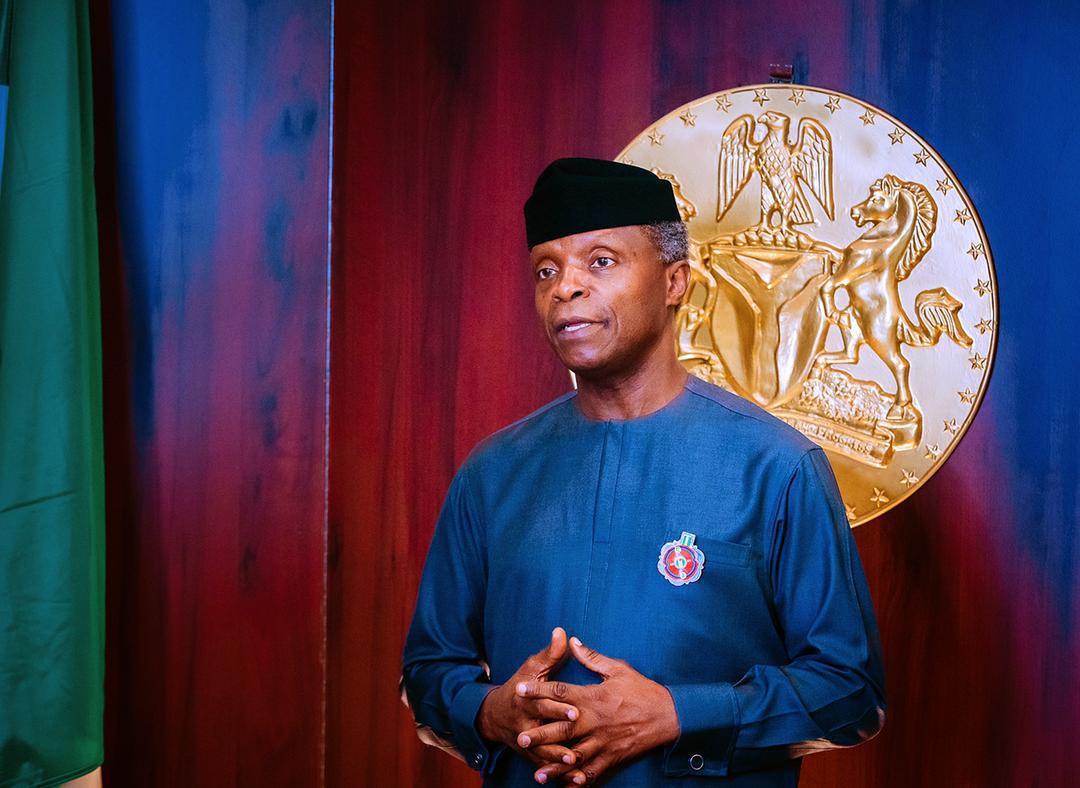
08 Dec Osinbajo declares LPG is Nigeria’s most viable option for net-zero emissions.
Vice-President Yemi Osinbajo says the use of liquefied petroleum gas (LPG) as a transition fuel is the viable option for Nigeria to address climate change and energy poverty.
According to a statement by his spokesman Laolu Akande on Tuesday, Osinbajo spoke in a keynote address in Dubai, United Arab Emirates, at the week-long World Liquefied Petroleum Gas Association (WLPGA) forum themed ‘Energizing Tomorrow.’
Osinbajo said LPG and natural gas are sustainable energy fuels that could address both climate change and energy poverty simultaneously.
“The world should not have to choose between energy poverty and climate change as this can be addressed with both natural gas and Liquefied Petroleum Gas as transition fuels alongside other renewable sources,” the statement quoted him as saying.
The VP said that it was ‘worrying that a growing number of wealthy nations have banned or restricted public investment in fossil fuels, including natural gas.’
This, according to the vice-president, resulted from increasing pressures to address climate concerns in the world without reviewing the economic importance of such investments to developing countries.
“Such policies often do not distinguish between different kinds of fossil fuels, nor do they consider the vital role some of these fuels play in powering the growth of developing economies, especially in sub-Saharan Africa,” he said.
“As development finance institutions try to balance climate concerns against the need to spur equitable development and increase energy security, the United Kingdom, the United States, and the European Union have all taken aggressive steps to limit fossil fuel investments in developing and emerging economies.
“The World Bank and other multilateral development banks are being urged by some shareholders to do the same. The African Development Bank, for instance, is increasingly unable to support large natural gas projects in the face of European shareholder pressure.”
While acknowledging that all countries should play important roles in the fight against climate change, he emphasised that ‘a global transition away from carbon-based fuels must account for the economic differences between countries and allow for multiple pathways to net-zero emissions.’
Explaining further, Osinbajo said the government had developed an energy transition plan ‘which shows that achieving net-zero by 2060 will require investments of about $410 billion, above business as usual, and that natural gas will play a critical role in addressing the clean cooking challenge, as well providing grid stability to integrate renewables at scale.’
He said Nigeria had also developed an integrated energy plan with a clean cooking model which showcases the clean cooking opportunities across technologies such as electric cooking and LPG.
“This model shows that there is an opportunity to transition at least five million households to LPG solutions, which will cut emissions by 30% compared to business as usual, reduce other pollutants by 90% or more and avoid 6.9 billion kilogrammes of forest loss from biomass collection,” he added.
He said that for a gas-rich country like Nigeria, it is obvious that the most viable option in terms of balancing energy security with environmental sustainability would be the use of LPG as a transition fuel.
According to Osinbajo, for countries such as Nigeria – which has ample natural resources but is still energy-poor – energy transition fuels must possess certain qualities including affordability, reliability, equity, and inclusiveness.
He stated that Nigeria’s energy transition plan is tied to adopting and domesticating all forms of cleaner energy.
“These cleaner energy systems include solar for electricity, waste to energy, wind energy, hydropower, and natural gas. which aims to adopt and domesticate all forms of cleaner energy sources from household use to commercial use,” he said.
He said that the implementation of various initiatives and legal frameworks on LPG elevates it as the fuel of choice compared to other competing fuels.
“And we have established a 20 million cylinder injection scheme; 5 -10 million of these are to be introduced in pilot states next year. We have also established an LPG energy fund in the order of $50 million, in its first phase, in partnership with Afreximbank,” the vice-president added.
Osinbajo explained that the FG has ‘consummated a collaboration with the EU through a study on CO2 savings based on the National LPG Expansion Implementation Programme for clean cooking.’
“Also in the last three years, several LPG coastal terminals have been opened in Lagos, Warri, Port Harcourt, and Calabar, with the latest one opening in Warri later this month,” he said.
“We also have a waiver of import duty on machinery, equipment, and spare parts for the establishment of LPG plants for 10 years (subject to renewal) and a 5-year tax holiday for investors in the LPG value chain.
“Our target is 5,000,000MT, and this requires at least $6 billion for the required LPG infrastructure roll-out to meet our target.
“From inland and coastal terminals to cylinder filling plants, bobtails, semi-trailers, valves and regulators, Nigeria presents a unique LPG investment destination for setting up manufacturing facilities and support services for the expanded LPG value chain in the National LPG Expansion.”


Sorry, the comment form is closed at this time.